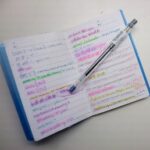Articles in the ‘Key study hacks’ category Page 4
-
Remembering is a skill you can learn
Contrary to what many people believe, a good memory can be trained. Memory champions are just ordinary people who have practised a lot. There are many clever techniques and tricks you can use to remember things (such as Chinese characters or words) very efficiently. This article is meant to be an introduction for those of you who are new to the fascinating world of memory training.
Read → -
How I used a notebook to learn more Chinese, and why you should too
The humble notebook is a powerful tool for learners of Chinese. Whether an exquisite leather-bound journal or a digital text file, a notebook offers more than a space to record information about vocabulary or grammar.
Read → -
Have fun learning Chinese or else…
Having fun while learning, or at least making the best of every situation, is essential. Learning a language requires a lot of time and if we don’t enjoy the process, we aren’t likely to invest the time we need to master a language.
Read → -
Learning Chinese in the shower with me
This article is about using time and space in your shower to learn more Chinese. This might seem extreme, but it’s just another method of diversifying your learning. Why spend high quality time in front of your computer or in the library learning things you could equally well learn in your shower?
Read → -
Vocalise more to learn more Chinese
Do you know how to make your passive learning more active and thereby learn a lot more Chinese? This article is about how you can increase your awareness of the language around you, process it more actively and therefore also learn more from the experience.
Read → -
Don’t just read about language learning methods, try them!
When reading about ways of learning languages, it’s easy to just nod or shake one’s head in approval or dismissal. This is not enough if we want to master the art of learning a language. We need to identify the methods or ideas that have potential and actually try them. Only then can we know if they are helpful or not.
Read → -
Extending mnemonics: Tones and pronunciation
Using mnemonics to memorise concrete objects is fairly easy, but how can we use mnemonics to remember abstract things such as tones and pronunciation? In this article, I expand my previous discussions of mnemonics and show how they can be quite powerful if you’re prepared to invest some extra time.
Read → -
The time barrel: How to find more time to study Chinese
If we want to combine studying with a normal life or if we want to get the most out of pure language studying, we really need to examine the time we have available and see if it’s possible to learn more without removing other important things. This article uses the metaphor of a barrel with rocks, pebbles, sand and water to show that most people have more time available than they think.
Read → -
Chinese listening strategies: Diversify your listening practice
It’s essential that you diversify your listening practice, otherwise you run the risk of performing below your actual level, not because your listening ability is poor, but simply because you’re not used to different people speaking Chinese. The only way to acquire a complete listening ability is by listening to as many different speakers as possible.
Read → -
Chinese Language Learner Interview Series – Olle Linge
I’m happy to announce that an interview with me have been published over at FluentFlix. To see what other things I’ve written elsewhere on the internet, please see Hacking Chinese elsewhere. In this interview, I talk mainly about learning Chinese (no surprise there), including some personal comments on my own learning and some embarrassing mistakes […]
Read →








